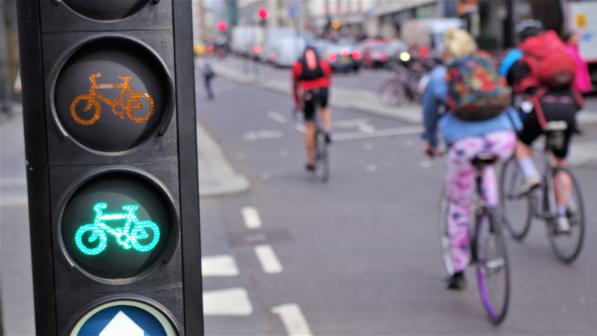How could the law protect cyclists better from car-dooring or drivers who fail to stop?

Car-dooring
Being knocked off when someone opens their car door without looking is a very real fear for cyclists, particularly in urban areas and around parked vehicles. As the case studies below show, a carelessly opened car door can lead to a collision with another vehicle, and the consequences may be fatal.
It is already an offence under construction and use regulations to open, or cause or permit to be opened, a car door so as to injure or endanger anyone. As part of our lobbying and campaigning for a full review of road traffic offences, however, we are urging the Government to overhaul the scope of and penalties for committing it.
In a separate article, we explain why we want the Highway Code's advice on opening car doors to be revised too.
Sam Harding
Sam Harding was killed in August 2012 when driver Kenan Aydogdu opened his car door in front of him on London's Holloway Road, knocking him off his bike and under a bus.
Aydogdu had decided to darken his car windows by fitting plastic tinting film, so the side windows only provided 17% transparency, detrimentally affecting what he could see from the driver's seat. The restricted vision wasn't an accident: it was an obvious result of a conscious choice.
Given that this was not a 'driving offence', and the maximum penalty for car-dooring is only £1,000, the Crown Prosecution Service (CPS) brought a manslaughter prosecution against him, but he was acquitted. Aydogdu was fined £200 for the car-dooring offence.
Sam's father Keith Harding told reporters that there was gap in the law, with a huge gulf in penalties between a nominal fine for car-dooring, which is treated and perceived as a regulatory offence, and a manslaughter conviction, which in most cases will be unrealistic. He added that: "The law needs to find something which is commensurate”.
Sam Boulton
Sam Boulton died in July 2016 on his 26th birthday. He was cycling along London Road past Leicester train station when the passenger in a private hire vehicle, Mandy Chapple, opened the offside rear door, knocking him of his bike into the path of a Citroen van.
The taxi driver, Farook Yusuf Bhikhu, had parked on double yellow lines outside the train station rather than use the station drop-off area, allowing his passenger to disembark on the road side.
Chapple pleaded guilty to car-dooring and was fined £150. Bhikhu was charged with permitting the car-dooring, but pleaded not guilty. He was convicted after a trial and fined £955, with further costs ordered after he lost his appeal.
Speaking to ITV News after Bhikhu’s conviction, Sam’s father Jeff Boulton said that a new offence should be introduced for causing serious injury or death by car-dooring, referring to the maximum £1,000 fine which “needs to change as it does not take into account if someone is killed or seriously injured.”
Robert Hamilton
Robert Hamilton was killed in January 2014, when Joanne Jackson opened the driver’s door of her car in front of him as he was cycling along Linaker Street in Southport.
The CPS considered a manslaughter charge, but concluded that there was insufficient evidence to provide a realistic prospect of conviction. The only remaining option was to prosecute for a car-dooring offence, for which Jackson was fined £305.
Following the case, Robert’s widow echoed Keith Harding’s comments saying: “I am so disgusted with the way these deaths are trivialised with very minor charges.”
The scale of car-dooring
Figures released by the Department for Transport (DfT) to Cycling UK show that, between 2011 and 2015, there were 3,108 people injured, eight fatally, where ‘vehicle door opened or closed negligently’ was a recorded contributing factor in incidents attended by the police. 2,009 of those casualties were people cycling, with five resulting in fatalities.
These figures are, however, highly unlikely to represent the true scale of the problem because the police only attend a small proportion of car-dooring incidents. While it is reasonable to assume that most serious injury and all fatalities lead to police involvement, and will therefore be recorded, minor injury cases (cuts, bumps, bruises etc.) are significantly under-reported as many cyclists do not involve the police when they happen.
As demonstrated in the case studies above, the gap between manslaughter and a construction and use prosecution for car-dooring is a chasm. The evidential test for the former presents a formidable burden of proof, whereas a prosecution and the resultant penalties for the latter can appear derisory.
This is not simply a justice issue. It matters for road safety too because it perpetuates a culture where a very real safety concern - car-dooring, the fear of which can deter people from cycling - is perceived to be:
- just one of those things that can’t be avoided;
- a trivial matter, a mistake anyone can make;
- something that isn’t a ‘proper crime’, just a regulatory error;
- something that drivers don’t need to think more carefully about, because the law treats it as a minor issue.
Need for a new offence of opening a car door so as to cause death or serious injury
Consequently, Cycling UK recommends that the Government consider a new offence, with more severe penalties, for opening a car door so as to cause death or serious injury. This step, which is supported by the families of those who have tragically lost their lives through car-dooring, would not only send out the message that this a serious issue, but also help focus attention on public awareness and education to reduce the number of incidents.
The DfT is currently in the process of undertaking an urgent review into whether new offences equivalent to causing death or serious injury by dangerous driving should be introduced for cyclists. The question at the heart of that review is whether or not there is gap in the law. Jeff Boulton, Keith Harding and May Hamilton would all say that there is a gap in the law around car-dooring, and ask whether that can be reviewed likewise.
Failing to stop
Cycling UK believes there should be increased penalties for ‘failing to stop’ offences where the driver must or should have known there was a possibility of a serious or fatal injury.
The offences of ‘failing to stop’ and ‘failing to report an accident’ encompass a wide range of offending behaviour, from failing to report a car park scrape resulting in damaged paintwork, to the driver who knows that they have been involved in a potentially fatal collision, but then flees the scene leaving someone in need of urgent medical attention.
There have been several fatal collisions with cyclists, often in rural areas or on quiet roads (or roads at quiet times), where drivers have left the scene and the cyclist has subsequently died. In 2016, for example, driver Michael O'Shea both failed to stop and report a collision that led to the death of cyclist Brian Tozer in Andover.
In some circumstances, the victim might have survived had immediate medical help been sought.
If ‘careless’ or ‘dangerous’ driving cannot be proved because there are no witnesses, the driver who fails to stop or report, if subsequently identified, can only be charged with a ‘fail to stop’ charge with a maximum six-month custodial sentence.
This is neither conducive to road safety, nor does it encourage reporting. Too often, particularly with collisions involving vulnerable road users, drivers leave the scene with relative impunity, and in some cases take a calculated risk because they know that the penalties are likely to be limited. Yet surely a driver who is, say, under the influence of drink or drugs and causes a collision and injures someone, must be given to understand that there are real and substantial penalties for failing to stop and failing to report?
Cycling UK is not suggesting that the current penalties are inadequate for non-injury vehicle damage cases. Rather, we believe that in potentially serious injury or fatal cases, the maximum penalties for failing to stop are inadequate, and that there are offences in this bracket for which a custodial sentence in excess of six months would be appropriate.
Increased penalties for ‘failing to stop’ offences where the driver must or should have known there was a possibility of a serious or fatal injury would:
- deter those involved in collisions from fleeing the scene;
- assist in securing early medical assistance in some cases; and
- reinforce the message that there are potential consequences for actions which compromise public safety on our roads.
This would benefit all road users. It is, however, particularly relevant for pedestrians and cyclists who may well find themselves immobile following a collision with a motor vehicle, while the driver, on the other hand, still has the opportunity to leave without reporting.




